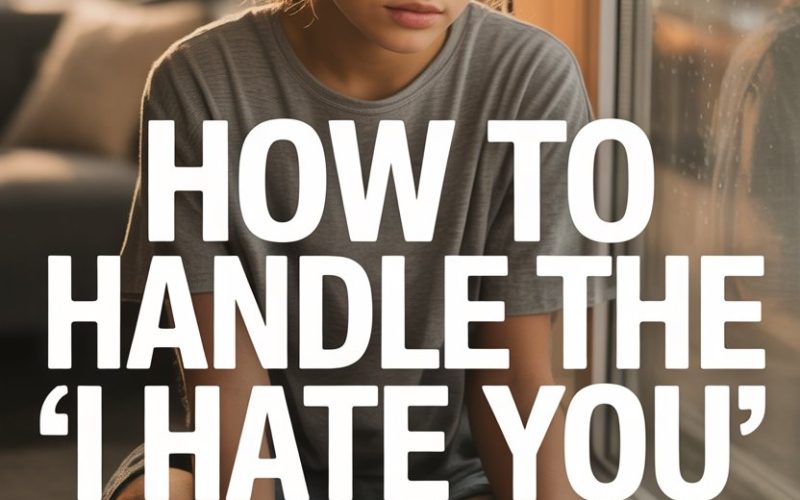If you’ve ever stood in your kitchen, clutching a mug of tea, and heard your beloved offspring spit out the phrase “I hate you,” you’re in very good company.
Welcome to the club—meetings are held nightly, often after dinner, always BYOB (Bring Your Own Biscuits).
“‘I hate you’” is the teenage parenting equivalent of stepping on a rogue Lego: it hurts, it’s sudden, and you wonder how on earth you got here.
But there’s good news: this phase doesn’t mean you’ve failed or that your relationship is doomed. There’s a lot more going on beneath that surface-level sass.
Let’s look at why this happens, what’s really going on, and how to respond without losing your mind (or your sense of humor).
The Teenage Brain Is Under Construction
Puberty might as well come with a hard hat and a warning sign.
The teenage brain is in the middle of a massive renovation project, with the prefrontal cortex—the bit responsible for planning, impulse control, and understanding consequences—lagging a good few years behind the emotional, reactive parts.
According to psychology professor Laurence Steinberg, teens’ heightened emotionality and risk-taking have everything to do with this “brain construction zone.”
This means your child genuinely feels intense emotions, and sometimes those emotions spill out as “I hate you,” even if they regret it five minutes later.
It’s not personal. (Well, it feels personal. But it isn’t, not in the neurological sense.)
Why ‘I Hate You’ Usually Means Something Else
Those three stinging words rarely mean what they say. Underneath, they might be feeling overwhelmed, embarrassed, powerless, or just plain hungry.
Teens are world-class at using dramatic language to express murky feelings. Clinical psychologist Lisa Damour has written that these outbursts often signal a struggle for autonomy, not genuine dislike for Mum or Dad.
Translation: “I hate you” often means “I feel out of control and I need space,” or, sometimes, “I really need a snack and a nap but I’m too grumpy to admit it.”
Breathe First, Respond Second
Your job isn’t to win an Oscar for Best Dramatic Reaction. It’s to stay calm, even if your inner monologue is waging a full-scale emotional riot.
Take a few deep breaths. If you can muster it, try for a poker face. Responding with anger or sarcasm almost always guarantees a full-scale teenage meltdown.
If you’re too upset to speak calmly, it’s perfectly fine to say, “I’m really upset right now—I need a minute.” Model the kind of self-control you’d like to see (even if you’re dying to shout, “Well I hate your messy room!”).
Boundaries Still Matter
Staying calm doesn’t mean letting your child trample all over you like a doormat from the pound shop. It’s important to communicate that, while you understand big feelings, there’s still a line when it comes to respect.
A simple, steady, “I know you’re upset, but I don’t accept being spoken to like that,” does the trick. Then, move on. No need for a lecture, just let them know the boundary exists.
Over time, these reminders do add up, even if you feel like a broken record.
Don’t Take the Bait
Teenagers are Olympic-level button-pushers. If you snap, shout, or rise to the challenge, things will escalate faster than a toddler in a toy shop.
If you can, stay as unflappable as a pensioner at bingo night.
Sometimes the best response is no response at all. You can always circle back later, when tempers have cooled. Try, “I see you’re upset. We can talk when you’re ready.”
This lets your teen know you’re available, but you’re not playing verbal tennis.
Dig Beneath the Surface
After the storm passes, and everyone has emerged relatively unscathed, check in. Not in a “let’s dissect your feelings for the next half hour” way, but something light: “Rough evening, huh? Want to talk about it?”
If they grunt, roll their eyes, or walk away, that’s par for the course. The important bit is they know you’re open, and not holding a grudge.
When teens do talk, try to listen more than you speak. Resist the urge to fix it, unless they ask. Sometimes they just want to vent.
Humor Helps… When Used Sparingly
Never underestimate the healing power of well-timed humor. If your teen’s in a huff because you suggested a curfew, a gentle (not mocking) joke can help defuse tension.
Example: “Guess I’m officially the villain in your origin story now, huh?” Smile, step back, and let the mood shift.
Used in moderation, humor reminds both of you that the world isn’t ending, and you’re both human.
Consistency Is Your Secret Weapon
If rules and routines only apply on alternate Tuesdays, your teen will sniff that out like a truffle pig. Consistency isn’t glamorous, but it’s the backbone of parenting through the stormy years.
If you say 10pm is curfew, then 10pm it is—even if you’re dealing with Olympic-level sulking.
Teens may protest, but the predictability of boundaries actually makes them feel safer. Think of yourself as the lighthouse during a storm, not the ship tossed about by every wave.
Let Them Cool Off (And Cool Off Yourself)
Sometimes, the best strategy is good old-fashioned space. If your teen is in meltdown mode, give them room. Go put the kettle on, fold some laundry, or walk around the block.
Space lets emotions settle. You’ll both be better equipped to talk things through when the adrenaline has stopped pumping.
Find Other Ways To Connect
The “I hate you” phase can feel lonely on both sides. Now’s the time to intentionally spend time together doing something low-pressure.
Cook their favourite meal, watch a daft comedy, or share silly memes.
Shared experiences, even small ones, remind your teen that your connection is bigger than whatever latest drama has erupted. Family traditions, inside jokes, and everyday rituals all help reinforce the invisible thread tying you together.
When To Worry
While a dramatic “I hate you” is typically part and parcel of adolescence, persistent cruelty, extreme withdrawal, or rapid personality changes shouldn’t be ignored.
If your teen’s behaviour seems out of character and isn’t shifting with time and support, consider reaching out to someone qualified, like a school counsellor, GP, or therapist.
Research published by the National Institute for Health and Care Excellence (NICE) underscores the importance of early intervention for adolescent mental health concerns.
Trust your gut—if something feels off, seek help.
Take Care of Your Own Feelings
Being the target of teenage rage is exhausting. Sometimes, you’ll find yourself lying in bed, replaying the day’s arguments, wondering where you went wrong (spoiler: you probably didn’t).
Talk to your friends, partner, or even a professional. Self-care isn’t just a buzzword; it’s survival. A walk, a chat, or even a chocolate digestive dunked in tea can work wonders.
This Too Shall Pass—Eventually
Remember that “I hate you” often signals growing pains, not relationship apocalypse.
Teenagers are just learning how to separate from you while secretly craving your approval. It’s confusing for them, too.
Many parents find that, with time, those three words are replaced by grudging gratitude, a clumsy hug, or—miracle of miracles—an offer to make you a cup of tea.
Brighter Days Are Ahead
Surviving the “I hate you” phase requires resilience, patience, and a willingness to laugh (at least a little) at the chaos of family life.
No one gets it right all the time, and even the most calm, loving parent will sometimes lose their cool.
The goal isn’t perfection—just a relationship that bends, but doesn’t break.
One day, you’ll look back and realize those heated words didn’t define your bond. They were just storm clouds passing over a rock-solid foundation.
Until then: keep calm, carry biscuits, and know you’re not alone.




